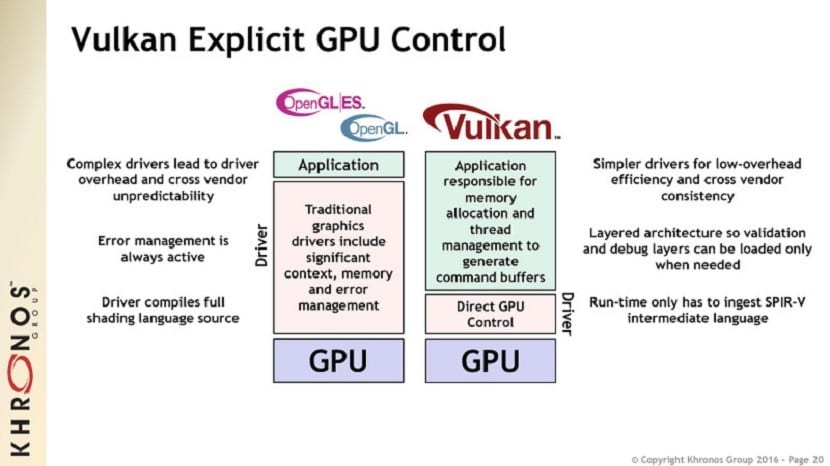
The new Vulkan 1.0 is the successor to OpenGL. Unlike this, Vulkan is able to bypass intermediaries when playing games, therefore it achieves more performance.
Yesterday, February 16, something happened that many of you have been waiting for a long time, since the first official version of Vulkan, version 1.0, has been released.
Vulkan is the answer of the creators of OpenGL to face the new DirectX 12 from Microsoft, being an API able to take full advantage of the power of the graphics card from your computer, whether you use Linux or use another operating system.
With the birth of Vulkan, games go to a new dimension since, unlike DirectX, is compatible with almost all platforms both Windows, such as Linux, and Android, with exceptional results in every way.
The secret of this API is that it is able to directly access the graphics card, directly controlling system resources to generate graphics, thus managing to skip intermediaries and increase performance. It is also compatible with almost all current graphics, both from Nvidia and AMD.
The reason for having stopped making OpenGL and having released Vulkan has been that OpenGL had not had the expected success in desktop games(although it had been successful on Android), requiring a complete overhaul.
With the birth of this API, gamers can have next-generation graphics without having to resort to DirectX 12, which can only be used with Windows 10. In addition, the cross-platform capability will undoubtedly attract many developers, as Vulkan has already released its own SDK to create games and graphics card companies will soon release the corresponding drivers.
As for games, the first compatible game is the Talos Principle, of which a Beta version has been released today of which you can see a trailer at the end of this article and that of course is available for Linux through Steam. In the future other games will be supported, with rumors that leading games like Street Fighter V they will be.
I have a question, is it proprietary or free software?
Free Software of course hehe, I forgot to mention it.
regards
then from what I understand the driver will no longer be so necessary
I like it!
It is impressive to see the contributions that developers make in open source, Vulkan will go a long way, and the big companies have noticed.
From my experience (not profsnl) I had not perceived great notoriety of OpenGl on the pc, perhaps a game ... Very specific cases. But in Android I did experience several games built under that API (but relatively recently with respect to the same pc API - probably because of that Remodeling of which #azpe refers to;)
After the good comes the bad; Some graphics are unsupported, at least until they are "adapted" by prop brands. Developing a new driver compatible with the Vulkan API
And a final question: Is the Vulkan API compatible with all types of graphics processors such as OpenGl or does it have some "minimum requirements"?